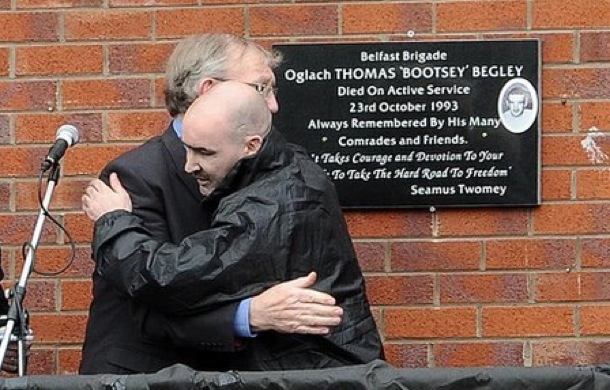22 October 2013
Thomas Begley Commemoration: BBC reinforces victims hierarchy

Thomas Begley's father, Billy, and Seán Kelly embrace at the commemoration
‘I offer no excuse that will change how any of these innocent people and families will think about myself or Thomas or the IRA as a result of this operation. I am truly sorry for the loss of life and the injuries that were suffered that day and for the suffering the families have endured’ – Seán Kelly
THE reaction to the unveiling of a plaque in memory of IRA Volunteer Thomas ‘Bootsey’ Begley on Sunday 20 October in Ardoyne, north Belfast, couldn’t have been any more predictable and stage-managed as unionist after unionist fought to outdo each other in their condemnation of the commemoration.
BBC Radio Ulster’s Nolan Show on Monday 21 October became a platform for incensed unionists who believe republicans don’t have the right to honour their dead in the first place, thus reinforcing the hierarchy of victimhood that has been so cleverly constructed and used to criminalise republicans, living or dead.
One nationalist caller to the BBC programme described the young IRA Volunteer whose bomb exploded prematurely, killing himself and nine other people, including two children, as “a soldier of Ireland”.
The horrified presenter asked with incredulity: “What kind of a soldier goes out to kill a 13-year-old child?”
Thomas Begley didn’t. But what kind of soldier does go out to kill a 13-year-old child?
In 1981, Julie Livingstone, just 14, was shot dead by a British soldier as she returned home from a local shop on the Stewartstown Road in west Belfast.
The soldier, a member of the Prince of Wales Regiment, fired a plastic bullet round from a heavily-armoured vehicle, hitting the schoolgirl in the head. She died in hospital the following day.
The British soldier who killed Julie lied about the circumstances of her killing, claiming there was rioting with petrol bombs being thrown. He refused to attend her inquest to explain his actions.
In April 1982, 11-year-old Derry schoolboy Stephen McConomy, like hundreds of other children in the city, made his Confirmation. Two weeks later, he was dead. He was shot and killed by a plastic bullet, fired by a British soldier just yards from his home in the Bogside.
The St John’s Primary School pupil had been out playing with friends on 16 April when a member of the British Army’s Royal Anglian regiment shot him in the head with a plastic bullet.
Eyewitnesses tried to go to the boy’s aid but were prevented from doing so by British soldiers who threatened to shoot them. Eventually, Stephen was taken to Altnagelvin Hospital and then immediately transferred to the Royal Victoria Hospital in Belfast, where he died three days later.
The British soldier who killed Stephen took the plastic bullet gun off the designated gunner and leaned over the driver to fire out a side window. The British military claimed the gun jammed and he was clearing it and pulled the trigger twice. They also claimed the gun was not accurate and that it did not fire in a straight line. Conveniently for the accused, the gun was later destroyed, despite the fact that it was involved in the death of a child.
The killers of these children had (and still have) the full backing of the British military, the British Government and the unionist political establishment.
So if the British state or its media and any of its broadcasters want to discuss issues to do with victims and perpetrators then it should realise that the debate is wider than the narrow anti-republican agenda they have set and propagate.
Seán Kelly, who was part of the IRA unit alongside Thomas Begley and was seriously wounded when the bomb exploded on the Shankill Road, spoke at the commemorative event. He said he was “truly sorry for the loss of life”.
Addressing a crowd of several hundred he described the explosion in Frizzell’s fish shop as “an IRA operation that went tragically wrong”. He added:
“I offer no excuse that will change how any of these innocent people and families will think about myself or Thomas or the IRA as a result of this operation. I am truly sorry for the loss of life and the injuries that were suffered that day and for the suffering the families have endured.”
Follow us on Facebook
An Phoblacht on Twitter
Uncomfortable Conversations

An initiative for dialogue
for reconciliation
— — — — — — —
Contributions from key figures in the churches, academia and wider civic society as well as senior republican figures





